Are you a coach or therapist struggling to get enough people to visit your website? Or maybe you’ve invested hours into building your online presence, only to find your site stuck way (way) down the search results?
Meanwhile, some of your peers are on the first page of Google, and you can’t fathom why your website doesn’t show up at all.
Trust me, you’re not alone. As a seasoned web designer for coaches and an SEO specialist (who’s also a qualified Personal, Leadership and Executive coach), I’ve encountered countless professionals just like you facing these exact frustrations.
I remember one client, in particular, a life coach, who was at her wit’s end trying to score all green lights on the Yoast plugin.
She was convinced that this was the magical key to unlocking endless visitors to her website without paying for advertising. While Yoast is a fantastic tool, it’s only one piece of the broader SEO puzzle. The true magic lies in a well-rounded, strategic approach tailored specifically to your needs and those of your ideal clients.
The good news is that even though coaching is a highly competitive niche and Google only wants to display the very best results, a lot of coaches don’t bother with SEO, so if you follow these tips they could really pay off!
I’m going to share tips that helped my clients and I rank our posts and pages top of the search results.
Who knows, you might even be getting a notification just like this one congratulating you on ranking for more keywords on the top of the search results.

What is SEO?
SEO stands for Search Engine Optimisation – it’s a continuous process of optimising your coaching website so that it gets found on search.
Why SEO Matters
SEO drives 1,000%+ more traffic than organic social media 🤯. Bright Edge
As a coach, mastering SEO can significantly enhance your online presence, making it easier for potential clients to find you.
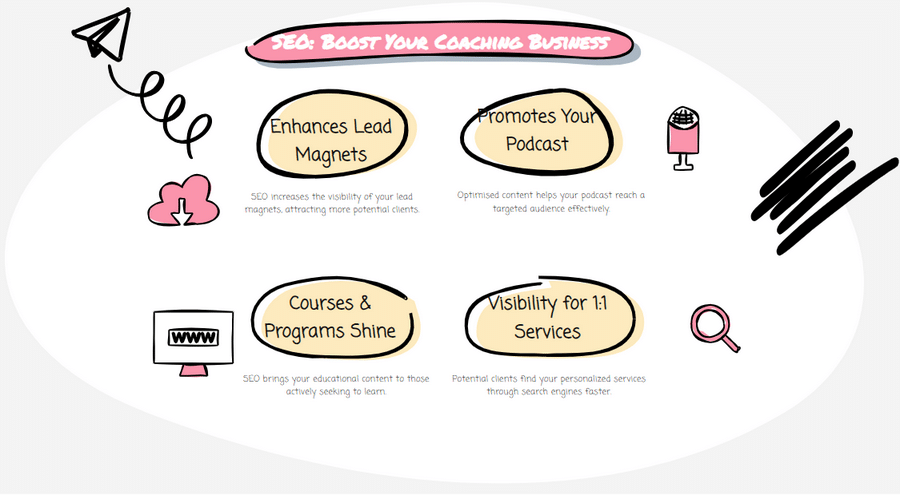
Understanding the Basics of SEO
Imagine your website as a fabulous shopping centre. It’s inviting and well-organised. But if it’s located on a quiet backstreet with no foot traffic, how will anyone discover it? This is where SEO comes in. It’s like moving your shop to a prime retail location, where everyone can see it.
SEO involves optimising various elements of your website to improve its ranking on search engine results pages (SERPs). When done correctly, it helps search engines understand your content and match it with users’ queries.
Think of search engines as matchmakers – they want to connect users with the most relevant information available.
Is SEO right for your coaching business?
Whether you’re an experienced coach or just starting your practice, getting clear on SEO is essential to help you get highly targeted visitors to your website.
In other words, SEO means that your website shows up on search engines like Google, Bing, etc. when someone enters a search query that is relevant to your website. They then click on your website and might read your home page, About page, and blogs and sign up for your email list.
Over time, there’s a good chance they’ll sign up for your offers or services. You may also get more word-of-mouth referrals as they get to know, like, and trust you.
Benefits of SEO for Coaches
With a well-thought-out SEO strategy, you can be found by ideal paying clients who are ready to work with you. And more traffic usually=more revenue.
SEO can help coaches get found online by people who have never heard of you before.
SEO can help you promote:
- lead magnets
- your podcast
- courses, workshops, memberships, and group programmes
- your 1:1 services (whether in-person or online)
- your expertise as a speaker
- digital products, etc.
It’s so worth investing time and energy into learning SEO and targeting the keywords you want to be found for, as your blog posts and pages can continue to be found by people who search for coaching for years to come!
When you know the right keywords to use and where to place them it can help your audience to find your content and learn about your services and what you offer.
Sadly, you could be the best coach in the world, but if your website isn’t SEO-friendly, very few people will ever find it.
That’s why SEO can be an incredibly powerful tool for coaches seeking to work with a specific niche. It’s not just about getting more “traffic” (visitors to your website), it’s about getting found by potential right-fit clients who are willing to pay you and actively looking for what you offer.
If you’re still unsure about this, you may benefit from my guide on simple SEO tips to boost traffic to your website.
1. Organic Marketing
By optimising your coaching website with keywords and phrases targeting specific phrases your target audience is already searching for, you can get in front of exactly the right people. Even better, once you get the hang of building your SEO your pages and posts can bring you qualified leads for years after you’ve hit publish.
Unlike social media updates that can garner fleeting attention— attention-grabbing but short-lived—a well-crafted blog post continues to attract visitors long after it’s published.
Why is this? Blog posts have a unique advantage: they’re evergreen. This means that they remain relevant and valuable over time, especially when optimised with SEO strategies.
Imagine a potential client searching for guidance on a particular issue months or even years from now. If your blog post addresses their needs, they’ll find it through search engines, bringing new visitors to your website consistently.
While social media is fantastic for immediate engagement and building community, its transient nature means you need to keep posting regularly to stay visible.
But here’s the magic: combining both can be incredibly powerful. Use your social media platforms to share snippets of your blog posts, driving traffic back to your site where visitors can explore more in-depth content. This not only increases your visibility but also establishes you as an authority in your field.
In essence, think of your blog as the foundation of your online presence—a place where you can build and showcase your expertise over time. Social media acts as the megaphone that amplifies your message and draws people in. Together, they create a dynamic duo that supports and sustains your business growth.
Skip to tips about the keyword research process
2. Boost Visibility
SEO-friendly content on your website can attract the right people to your website – on repeat. Without you having to faff about making Reels, researching hashtags, or trying to come up with a compelling caption.
If you have a love-hate relationship with social media like me, you’re probably breathing a sigh of relief!
If you’re willing to invest some time and effort (or outsource), SEO can really pay off. Even better, with SEO there’s a tipping point and once your content starts ranking, you could reap the benefits for years to come.
3. Boost Credibility
SEO helps Google and Bing to understand your services. Your website is more likely to show up at the top of the search results if it’s optimised for search.
Being featured on page one of Google conveys credibility and trust and potential clients are more likely to click on your link than if you’re languishing on page 47!
4. Stand Out In A Sea Of Coaches
Chances are, other coaches are not aware of SEO, or even if they are, they get so far and give up, mistakenly assuming that SEO doesn’t work for coaches, that it’s too techy and this, my friend, is where you have an amazing opportunity to stand out.
Many of your peers may be looking for quick wins and ignoring the benefits of SEO. If the majority of other coaches in your niche are disregarding SEO in favour of marketing on social media or speaking at events, it could be extremely worthwhile for you to learn search engine optimisation tactics to grow your coaching business.
According to Ahrefs, over 90% of websites get no traffic (visitors) from Google. Sounds like an opportunity if you are willing to invest some time to optimise your content!
If you’re stuck for blog content ideas check out these posts:
Blog content ideas for coaches
Keyword Research: The Heartbeat of SEO
Keywords are the lifeblood of any successful SEO strategy. They are the terms and phrases that potential clients type into search engines when looking for coaching services. Identifying and incorporating these keywords into your content is crucial if you want to get clients through your site.
Start by brainstorming what words or questions someone might use to find a coach in your niche. For instance, if you’re a life coach specialising in stress management, potential keywords could include stress management techniques, life coach for stress relief, or how to reduce stress.

Once you’ve identified these keywords, weave them naturally into your website’s content. Avoid keyword stuffing – overloading your content with keywords can make it unreadable and may even result in penalties from search engines. Aim for a balance where keywords fit seamlessly within engaging and informative content.
Tools and techniques for effective keyword research
Choose a keyword research tool. These tools can help you identify popular keywords, search volume, competition, and related keywords.
1. Use keyword research tools: There are a variety of keyword research tools available, including my favourites Keywords Everywhere, and Ubersuggest
2. Analyse your competitors: Look at what keywords your competitors are using in their content. This can give you insights into what keywords are driving traffic and conversions in your industry.
3. Use long-tail keywords: Long-tail keywords are longer, more specific keyword phrases that typically have less competition and higher conversion rates. Include long-tail keywords in your research to target niche audiences.
4. Consider search intent: Understand the intent behind the keywords you are researching. Are users looking for information, products, services, or local businesses? Tailor your keyword strategy to match the intent of your target audience.
5. Monitor trends: Keep an eye on industry trends and seasonal fluctuations in search volume. This can help you identify new keyword opportunities and adjust your strategy accordingly.
6. Use keyword modifiers: Include modifiers such as location and other specific details to refine your keyword selection and target specific user needs. Content optimizers like Rank IQ or Neuronwriter can really help with this.
7. Organise keywords into groups: Group your keywords into thematic clusters to create more targeted and relevant content for your audience. This can also help you track the performance of different keyword groups.
Best SEO Keywords for Coaches
Short-tail keywords and long-tail keywords are two types of keywords used in SEO strategies.
Short-tail keywords are typically broad search terms that consist of one or two words. They are more generic and are often used by users who are in the early stages of their search process. While short-tail keywords have a high search volume, they also have high competition, making it challenging to rank for these keywords.
On the other hand, long-tail keywords are specific and detailed search terms that consist of three or more words. These keywords are more targeted and specific to a particular niche or topic, making them more relevant to users who are closer to making a purchase or decision.
Although long-tail keywords have lower search volume, they also have lower competition, making it easier to rank for these keywords.
Many coaches make the mistake of thinking all keywords are created equal and end up choosing the types of keywords that are too competitive to rank for.
For example, if you’re a life coach and you’re new to SEO, naturally you might think “life coach” would be a great term to target.
Unfortunately, plenty of other coaches will have had the same idea and it’s unlikely you’ll be able to rank your website with terms like “life coach” when your website is just getting established.
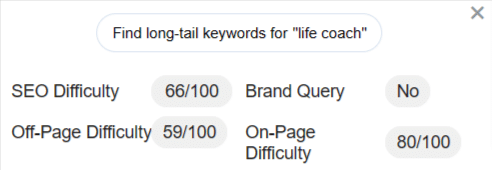
The other problem is that if someone types in a word or phrase like life coach when they’re searching online, it’s not clear what type of information they are hoping to find.
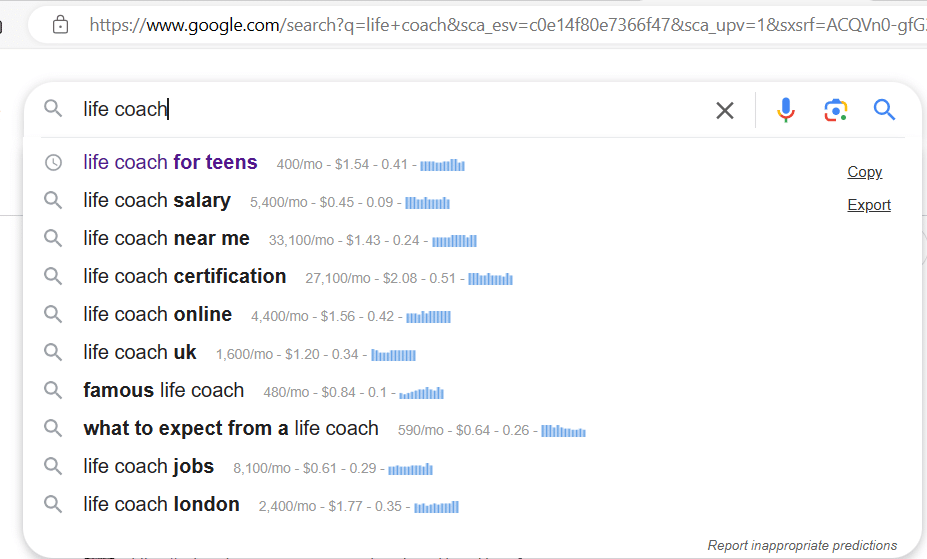
They might be looking to find and choose a life coach, but they could easily be looking into training as a coach themselves.
That’s why you need to use longer keywords like “life coach Dublin”, “Business coach Galway”, etc. if you want to use SEO effectively.
The beauty of using long-tail keywords is that the person typing a query such as “relationship coach Dublin” is very specific about the type of result they are looking for. They are also more likely to convert because they are actively trying to find someone to work with.
If your website is brand new, it’s even more important to aim for a key phrase (also known as a long-tail keyword) rather than trying to rank for a keyword like coach etc.
There’s also a fine line between choosing keywords your target audience is actively searching for and being overambitious about the likelihood of ranking for that search term.
That’s why you should aim for a keyword or more likely a key phrase with a relatively high search volume and low competition, especially if your website is brand new. You need to know about SEO search volume and keyword difficulty and search for keywords you have a chance of ranking for.
Your website can help you get more coaching clients by researching popular industry terms, long-tail phrases, and trending topics related to your niche.
You can also get keyword ideas by looking at what your peers are writing about – but put your own spin on it!
SEO for Coaches: Step-By-Step Guide
Identifying Your Target Audience
Identifying the target audience you want to attract is the cornerstone for the success of your SEO strategies. If you have received guidance from a business coach, you may already be aware of the idea of an Ideal Client Avatar (ICA).
I highly recommend creating an ICA before investing in SEO or doing it yourself. Defining your ICA will give you an insight into the specific characteristics of your ideal client, including demographics, psychographics, interests, needs, and pain points. This information can help you tailor your SEO efforts to attract the right audience to your website.
For example, if you are a fitness coach targeting busy professionals who are looking to improve their health and wellness, your ICA may be a woman in her 30s-40s who works in a corporate job, struggles to find time to exercise, and is looking for convenient, quick workouts she can do at home.
With this information in mind, you can optimise your website content, keywords, and marketing strategies to specifically target potential coaching clients.
This may include creating blog posts on topics like “15-minute home workouts for busy professionals” or “Healthy meal prep ideas for working women.”
By focusing on your ICA in your SEO strategies, you can attract high-quality leads who are more likely to convert into paying clients. This targeted approach can help maximise your marketing efforts and drive success for your coaching business.
Part 1: Optimising On-Page Elements
Step 1. Do a brain dump of the best life coaching keywords
Market research and tuning in to your audience will help you find the best life coaching keywords for your niche.
Here are some tips to help you generate a lot of keywords even if you’re not familiar with SEO:
- Join Facebook groups related to your niche: For example, if you’re a health coach working with women in perimenopause you can scan the group to see what types of questions your audience is currently stuck on
- Find keywords using Answer the Public, Also Asked, and Answer Socrates: These SEO tools can help you identify the things people search for online
- Enter the type of coaching you provide into Google and scan the list of autosuggestions, people also asked, and related keywords sections
- Use Pinterest and YouTube to create a list of keywords you can use to grow your business

Step 2: Use Keyword Research Tools
Keyword research is essential if you want to give your website a fighting chance of ranking well online, yet so many coaches skip this step.
Finding the right keywords can seem overwhelming and a lot of coaches make the mistake of trying to rank for overly competitive terms that they don’t stand a chance of ranking for.
You don’t have to invest a fortune to use a keyword tool.
Ubersuggest and Keywords Everywhere are a couple of cost-effective tools to help you refine your list.
Step 3: Choose LONG-tail (specific) keywords
Specific keywords are far more useful because they target a more refined audience.
Your site visitors will want to find specific information or answers and these keywords help you connect them with the right content.
That might be
- a helpful guide or tips that you link to on your article to grow your email list.
- worksheets or a free course that you offer to nurture potential clients.
- blog posts that would interest new clients
- case studies that explore helpful tools and techniques
Specific keywords can be easier to rank for and they can also indicate that your website visitor is “problem aware”, i.e. they are looking for a solution.
Read this article if you are looking to create quality content for clients.
You can see how having an SEO strategy rather than making it up as you go along could improve your website content to match the needs of your target audience.

Step 4. Use the keywords to promote your coaching services
Now that you’ve found relevant keywords for your website pages and posts, we’re going to add them to your site.
Content is king, but quality reigns supreme. Search engines favour websites that provide valuable, well-written content that addresses users’ needs. As a coach, you have a wealth of knowledge to share – so let that expertise shine through!
Create blog posts, articles, and guides that offer actionable advice and insights related to your coaching niche. For example, you could write about effective goal-setting strategies, mindfulness practices, or tips for maintaining work-life balance. Each piece of content should be informative, engaging, and tailored to resonate with your target audience.
Incorporate multimedia elements such as images, videos, or infographics to enhance the user experience and keep visitors engaged longer. Remember, the more time people spend on your site, the more favourable it appears to search engines.
Add your keywords:
- to page titles and blog titles – these appear as clickable headlines on SERPs
- to headings and sub-headings (H1 to H6)
- in your URLs
- to your meta description -brief summaries that give an overview of your page or post content
- in the first 100 words of your post
- within the last 100 words of your post
- 2-3 times within the page or post
- when naming your images and within ALT text – describe images to help search engines understand the context
- use internal links – help visitors to your site to find related pages by adding links to related content
PART 2: Off-Page SEO Strategies
Step 5: Building Backlinks
Backlinks – links from other reputable websites pointing to yours – act as votes of confidence in the eyes of search engines. They signal that your site provides valuable information worth sharing.
Tips to build backlinks:
– Guest Blogging/Podcasting: Write guest posts for industry-related blogs or websites. Be a podcast guest and usually you’ll get a backlink to your site.
– Networking: Connect with other professionals in your field who might link back to your content.
By fine-tuning these elements, you’ll create a cohesive structure that both users and search engines will appreciate.
Social Media Sharing: Promote your content across social media platforms to increase its reach.
Local SEO: Reaching Clients in Your Area
– Importance of Google My Business
– Getting reviews and local citations
As a coach offering personalised services, local SEO can be particularly advantageous. It helps ensure that people searching for coaches in their area find you easily.
Claim and optimise your Google My Business listing by providing accurate contact details, operating hours, and client reviews. Encourage satisfied clients to leave positive reviews – these can significantly boost local rankings.
Additionally, incorporate location-specific keywords into your content (e.g., career coach in Maynooth) so that search engines know where you’re based.
Remember that quality trumps quantity; a few high-authority backlinks are far more beneficial than numerous low-quality ones.
STEP 6: Measuring Success: Analytics and Adjustments
– Tools for tracking your SEO performance
– Making data-driven adjustments to improve results
SEO isn’t a set-it-and-forget-it task; it’s an ongoing process requiring regular monitoring and adjustments. Use tools like Google Analytics and Google Search Console to track key metrics such as organic traffic growth or keyword rankings.
Analyse which strategies are working well versus those needing refinement – then tweak accordingly! Test different variations of keywords and refine your strategy based on the data you collect.
Stay informed about changes in algorithms or best practices by following reputable sources within the digital marketing community.
Mastering SEO may seem daunting at first glance but remember every step brings you closer towards greater visibility & client engagement!
The beauty of SEO is that it can help you to create content your ideal client is eager to read AND bring you a lot of traffic over time as you start to rank for that keyword.
Researching keywords and search phrases can take time, but it’s a worthwhile investment of your energy!
Remember SEO helps coaches just like you to get found online by their ideal clients.

Frequently Asked Questions
What Is The Best Way To Optimise My Website For SEO?
If you want better visibility online you need to do some SEO work to increase the quantity and quality of visitors to your website. This takes thoughtful planning, keyword research, optimising your content, link building and other tactics to help your site appear higher in SERPS (Search Engine Results Pages).Here are six tips to help you optimise your website for SEO: Research keywords and key phrases that are relevant to life coaching. Choose words or phrases that a potential client is likely to type into Google when searching for a life coach. Avoid keyword stuffing- create content that answers user queries with valuable insights. Create brand awareness by writing blogs that position your offers as a solution to a problem your ideal client is experiencing. Use internal links to other helpful content you’ve created to keep visitors on your website. Build links from trusted, high-authority websites back to yours as part of your ongoing SEO strategy. These links indicate to Google that your site is credible. Track your progress using analytics and measure how well your efforts are paying off over time.
Why is SEO important for coaches?
Optimising your website is essential if you want more targeted visitors through organic search. SEO should form part of your marketing strategy for your life coaching services as it can help to improve the visibility of what you do online. Investing time in SEO can help you to get more coaching clients.
How Do I Choose The Right SEO Keywords For My Niche?
Either invest in SEO services or take time to learn SEO marketing strategies yourself so that your website content reaches its intended audience. Start by researching what other health coaches or life coaches in your field are doing in terms of website content. Note down the phrases or topics that are relevant to what you do. Use tools such as Keywords Everywhere to generate ideas based on popular searches over time. Once you have identified potential keywords, use keyword research tools such as Ubersuggest or Keywords Everywhere for further insight into how frequently the term is searched and how competitive it is.
How Often Should I Update My Website With SEO Content?
The best approach is to stagger your SEO tasks and update your site regularly. Some tasks will take less time – updating image alt tags or writing a meta-description for example. You can refresh existing content by adding FAQs or including a content upgrade (a freebie opt-in) that gives a potential client a quick win and showcases your coaching business. Even tiny tweaks and updates can help to increase visibility and page ranking. Analyse your competition to get an insight into the type of content they’re creating and how often they post new content. Review your analytics to gauge which posts are most successful in driving traffic based on user engagement metrics such as click-through rate (CTR) dwell time. You may choose to focus your efforts on boosting the posts that are already popular. Set realistic expectations when it comes to your editorial calendar – it’s far better to write 12 comprehensive posts a year than to write a weekly post that isn’t as in-depth. Focus on quality over quantity so that you gain some traction in organic search. Over time you can revisit older posts that aren’t performing as well. Use Google’s People Also Ask and the auto-complete feature to add new content to existing pages and posts.
Can I Outsource Content Creation?
Absolutely! But use discernment. You want to increase the number of website visitors who are truly interested in your services. SEO can help you differentiate yourself from your peers and get found online. However, you also need to create content that gives a sense of who you are. So if you choose to outsource your content creation, you need to make sure it still has your voice. It could be well worth your while to invest in a content brief – tapping into the expertise of a professional who can advise you on drafting an outline that covers the range of topics your reader will expect you to cover in your articles. They can also help you to identify easy-win long tail keywords to give you the best chance of ranking. A VA could also help you craft effective titles and tags if they understand how keywords and keyphrases work. Outsourcing helps you to scale your content creation and hiring an expert means that they will research the types of content that work best for your niche.
What Are Common SEO Mistakes to Avoid?
Don’t be too spammy- avoid over-optimising your posts by trying to use your keyword/keyphrase too often. Check that the pages you want to rank aren’t marked with a no-index tag. Make sure your website is mobile-friendly and that your theme isn’t slowing down your site. Avoid uploading very large images as these can take a long time to load and affect your site speed. Make sure that you have identified a specific niche, otherwise, your content will be too generic and won’t rank.
Wouldn’t It Be Easier To Forget About SEO And Just Pay For An Ad?
There are two problems with that approach -1) your potential clients may be less likely to trust a result that is labelled as an ad. 2) once you stop paying, your coaching website will no longer rank high in the search results. In my view, it is a mistake to be completely reliant on paid strategies to grow your coaching business.
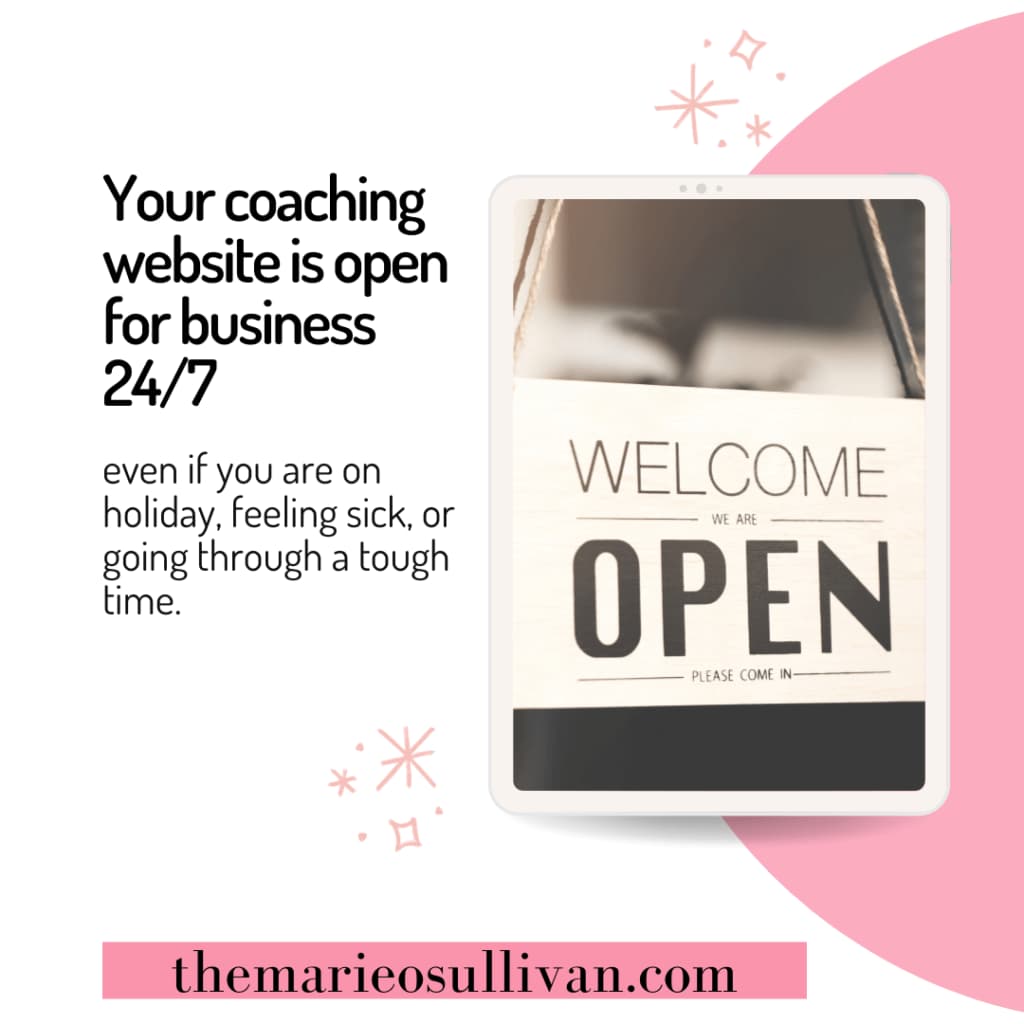
Your coaching site is open for business 24/7, even if you are on holiday, feeling sick, or going through a tough time.
If you create evergreen content (content that isn’t time-bound and is relevant at any time of year) and implement SEO effectively, you will still build awareness about your services even if you need to take some time off.
Final thoughts: Grow your coaching business with seo
By understanding the basics; researching the right keywords crafting high-quality content, optimising on-page elements building backlinks leveraging local SEO monitoring progress consistently -you’ll position yourself ahead of the competition attracting ideal clients organically.
I hope you found these simple SEO techniques help to attract more targeted visitors to your site. I’d love to hear how you used these tips to connect with the humans who need you.
Resources you may find helpful:
Click here to download my free resource – 10 bite-sized steps to research, write and share your 1st or next blog post (without letting Imposter Syndrome, Overwhelm, or Perfectionism get in the way).



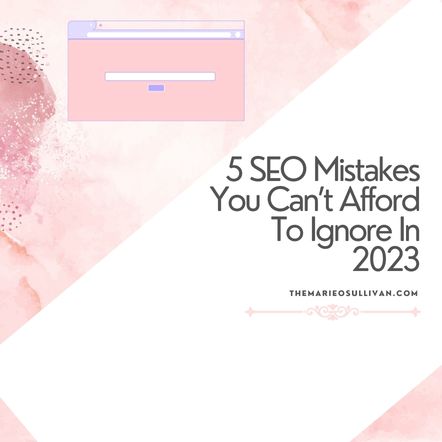
Thank you Marie. This post was insightful and exactly what I needed for my website. I will definitely use your tips to help climb up the ranks.
Looking forward to more of your posts.